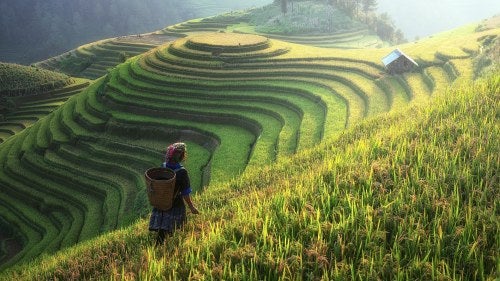Yogurt and AI, Five Inventions to Fight Climate Change, and Florida Sued By Chinese Immigrants
Check out our roundup of the week's top news and research in food, agriculture, and global development.

Top Story
States Accelerate Efforts to Block Chinese Purchases of Agricultural Land
States are increasingly considering or passing laws to prohibit foreign entities, particularly China, from purchasing farmland. The proponents of these measures argue that it is necessary to safeguard food security and protect sensitive installations like military bases. However, experts have raised concerns that these laws are reminiscent of past discriminatory legislation such as the Chinese Exclusion Act. Critics emphasize the importance of evidenced-based decision making and pursuing national security measures that do not contribute to racial discrimination.
Council Insights
Young Stewards of Agriculture
“I think most of the time the bigger decisions are made by the people who have worked in this industry and therefore, what could be done better is educating people like young people,” said Natacha Akaliza in this week’s Youth and Agriculture podcast. “Involve them in the decision making or how the decisions are being made, so that they feel included or excited about what is being done.” Listen or read the transcript of this episode on our website.
 Food and Agriculture
Food and Agriculture
Food and Agriculture
Five Farming Technologies to Tackle Climate Change
In response to the daunting challenges that agriculture is projected to face in the wake of climate change, growers are exploring new technological solutions. Some of the latest innovations include self-planting seeds, flexible sensors for plant leaves, high-tech beehives, and fruit-picking robots. While these technologies show promise, further improvements are needed to make them more cost-effective and energy-efficient for widespread adoption in agriculture.
Himalayan Glacier Melt
A recent ICIMOD report found glaciers in the Himalayan mountains melted 65% faster than in the previous decade. Rapid melting raises concerns of a freshwater shortage for the 2 billion people among 16 countries who rely on the mountains’ rivers. The rivers are used for farm irrigation and livestock, and the melting could threaten biodiversity and cause farmland flooding and subsequent drought.
Aerial Crop Tech
Guardian Agriculture, a Boston-based company, has secured $20 million in new funding to accelerate the production of its crop-spraying drones. The company's SC1 autonomous eVTOL drone offers enhanced reliability and performance, and can carry 20 gallons of pesticide to cover 10 to 20 acres of crops. The funding comes from a syndicate of investors led by Fall Line Capital. Guardian Agriculture aims to revolutionize aerial crop protection systems and address reliability issues faced by farmers with its advanced drone technology.
Deeper Dive
Lawsuit in Florida
Chinese immigrants have filed a lawsuit against Florida over a law that prohibits citizens of "foreign countries of concern," including China, from buying land near military installations. They argue that the law is unconstitutional and discriminatory, violating equal protection and due process guarantees.
Resilience
England’s Food Controversy
The court of appeal in England has granted permission for a full judicial review of the government's food strategy after campaigners argued that ministers broke the law by failing to include plans to reduce meat and dairy consumption. The court ruled that the national food strategy did not take into account ministers' duties to cut carbon emissions. A successful legal challenge could compel the government to revise the strategy with measures to reduce animal product consumption and prompt other departments to implement policies to meet carbon budgets. The Climate Change Committee has emphasized the importance of reducing meat and dairy consumption to address the climate emergency.
DC Report
SNAP Reaches Guam
USDA announced that low-income Guam residents affected by Super Typhoon Mawar could be eligible for the USDA’s Disaster Supplemental Nutrition Assistance Program or D-SNAP. As a result, almost 30,000 households that would not normally be eligible for SNAP benefits may qualify if they meet certain criteria, including having qualifying disaster-related expenses.
Big Actors
Refinancing the Climate Fight
World leaders will join Macron in France to discuss global financial investment in climate change action. The summit will focus on carbon neutrality, biodiversity, and food security, which experts argue are all interrelated. Akinwumi Adesina, the president of the African Development Bank has specifically advocated for greater financial commitments to Africa from other nations.
Big Ideas
Yogurt and AI, An Unlikely Pairing
Danone yogurt is using AI to strengthen the company’s understanding of how the human gut and microbiome react to yogurt. The company hopes their studies of probiotics will reinforce food as medicine, increasing the health of their consumers and their own sales revenue.
Ask an Expert
What is the main reason food systems are failing people living in poverty?
“The reality is, there’s this line that everyone uses: we grow enough food to feed everyone, we just grow it in the wrong places. We don’t grow enough nutritious food. Sixty percent of the calories we consume are from five grains, and some would argue as much as 70 percent. We don’t grow enough nutritious food, particularly in places where vulnerable, hungry people live. What we subsidize is not what people need to meet the nutrient requirements to lead healthy lives. That’s what we need to change. In the United States, until quite recently, fruits and vegetables were considered specialty crops and they didn’t receive the subsidies or the insurance support that commodity crops receive, and so we have fewer and fewer farmers that are willing to invest in crops that could provide more affordable access to nutritious food. That’s what needs to change.”
— Distinguished Fellow Ertharin Cousin in WSJ's Global Food Forum


Have a question about food and agriculture? Ask one of our experts at the Center on Global Food and Agriculture to get an answer in next week's Global Food for Thought!
Council Events
Did you miss one of our previous livestreams? Don't worry! They are all available on our website to watch at any time.
Other Upcoming Events
Improving Global Agricultural Data (IGAD) Community of Practice- Third IGAD Annual Virtual Meeting 2023
Date: June 21 - 30
Farmers Market Training - 101
Date: June 26
Time: 12:00 - 2:00 p.m.
Green Food Hack
Date: June 30
Time: 8:00 – 10:00 a.m.
Becoming Friends with Plants
Date: July 21
Time: 10:00 a.m. - 4:00 p.m. ET
Land Acknowledgement Statement
The Center on Global Food and Agriculture recognizes it occupies the ancestral land of the Kiikaapoi, Peoria, Kaskaskia, Bodwéwadmi, and Myaamia people. Indigenous communities around the world disproportionately experience the pressures of climate change, global conflicts, and the COVID-19 pandemic, while simultaneously stewarding 80 percent of the world’s biodiversity. These Indigenous tribes and nations are the original owners of this land and continue to be systemically erased by policies and practices that ignore their histories. To learn more about Indigenous foodways and practices, check out our 2022 blog series "Stewardship, Sovereignty, and Solutions."
Related Content
- Embracing Dandelions as Food and Medicine
- Going Beyond Regenerative Agriculture on Tribal Lands
- Expanding "638" to Enhance Native American Food Sovereignty
- Flavors and Culture: Food Systems Through Indigenous Women's Eyes
- A Thanksgiving Legacy: Fighting for Indigenous Food Sovereignty
- Native Food Sovereignty: Strengthening Connection to Culture
- Reconnecting to Indigenous Food Sovereignty Values and Practices
- Embracing Interconnectedness: How Indigenous Foodways Can Save Us




